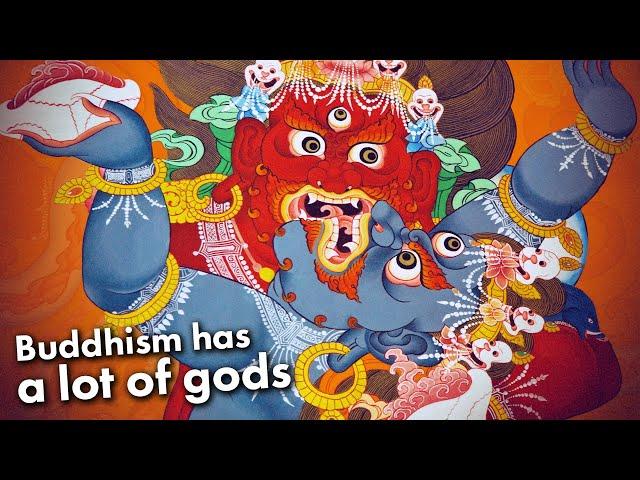
Is Buddhism an Atheistic Religion?
Комментарии:

I think part of our confusion derives from the fact that, when we think about religion, we think about the three abrahamic religions or, in second instance, about the classic Greek pantheon.
Those form of religion are the institutional forms of religion, the result of centuries of adaptation between the supernatural and the everyday, political world of men.
There are earlier forms of religion, those based on the worship of small, local deities that are especially common in rural societies. We find abundant traces of them in the form of nymphs, dryads, gnomes, selkies and all of those supernatural creatures that people still believed in in the middle ages and that the official church either considered superstition or the devil's spawn.
I deem it probable that Buddhism, at its birth, found itself in this kind of environment, with people believing in a myriad of local entities, either benevolen or malevolent.
As these beliefs were in no direct contradiction to the orginal teachings, Buddhism was probably indifferent to them at the beginning and ended by incorporating them later on.

Also, to add to this one, I recommend the video on this topic by Doug from Doug's Dharma :)
Ответить
I once procreated by smiling at a girl I liked.
Ответить
I think Buddhism is an atheistic religion, but is it? I guess I have to watch the video to find out!
Ответить
Which Buddhism?
Ответить
Judaism, and Christianity because it accepts the Bible, also has lots of gods!
"Elohim has taken his place in the divine council; IN THE MIDST OF THE GODS he holds judgment." - Psalm 82:1
“...for you shall worship no OTHER GODS, because Yahweh, whose name is Jealous, is a jealous God." - Exodus 34:14
“For I will pass through the land of Egypt this night, and will smite all the firstborn in the land of Egypt, both man and beast; and against ALL THE GODS of Egypt I will execute judgment: I am the LORD.” - Exodus 12:12

Howto get rejected by Buddha (djinn) and never return =/
Ответить
Religion and culture makes spiritual teachings so complex. The Buddha probably didn't intend that his awakening would turn into such complex theories. Practice is what matters, not complex religious beliefs.
Ответить
Kamadhatu
Rupadhatu
Arupyadhatu
Mount Meru/Sumeru
Paritta (Theravada)

Fantastic video.
Ответить
This is awesome!
Ответить
For the non Hindu people here.
Brahma = Creator of the Trinity.
Brahmã = Universal self of God. One aspire the union for salvation with.

Buddhism got gentrified
Ответить
Buddism is just another way of wasting time and resources. There is no such thing as Atheistic Religion. Whatever Buddism can give you, Consumerism can too.
Ответить
Buddhsim is more compatible with atheism. Stripped of all the supernature elements, Buddhism still has some unique insights into human spirirual existence. While devoid of the supernatural, Christianity and Islam is but a collection of mundane moral platitude.
Ответить
This "rejection" of any aspect of the Buddha's teaching is not among us. What is among us is following the "Dvasatya" (Two Truths Doctorine) and the "Madhyamāpratipada" (Middle Way Doctorine) between either extreme of Naturalism, Supernaturalism, Both, or Neither—in the ancient Mahāsāṃghika tradition of the Prajñaptivāda school which never left Shakyamuni's homeland of Northern India and Nepal and was practiced in the Himalayas well into 10th Century.
The "Dvasatya" (Two Truths Doctorine)—for us this means that "Satya" (Truth) is both/either "Saṁvṛti-satya" (Provisional Truth—i.e. Devas, Asuras, Nagās, etc.) and/or "Paramārtha-satya" (Ultimate Truth—i.e. "Śūnyatā" (Nothingness), "Anicca" (Impemenance), "Anattā" (Anti-Eternalism), "Pratītyasamutpāda" (Dependant Origination), "Dukkha" (Disatisfaction), etc.).
When applied to the Sutras, whole words, sentances, sections, etc. of Shakyamuni's teachings of the "Dharma" (Phenomenon) can be classed as Nītārtha (Clear Meaning) and/or Neyartha (Unclear Meaning). This is a practice which we share in common with the Theravadin school. Unlike the Theravadins, we ground our "Upaya" (Useful Means) of the "Dvasatya" (Two Truths Doctorine) in the "Madhyamāpratipada" (Middle Way Doctorine) to produce an interpretation that allows us to also distinguish between "Tattva" (Reality—i.e. a sort of immaterialistic~materialism) and "Prajñapti" (Conceptions—i.e. a sort of materialistic~immaterialism).
Doing all this allows us to classify any "Saṁvṛti-satya" (Provisional Truths) in the Sutras as Neyartha (Unclear Meanings) and therefore as "Prajñapti" (Conceptions); and any "Paramārtha-satya" (Ultimate Truths) in the Sutras as Nītārtha (Clear Meanings) and therefore as Tattva" (Reality). As all Sutras are not direct experiences, were written by falible men, and must be read and interpreted through the "Skandhas" (Agragagates) all scripture is classified as "Prajñapti" (Conceptions) by default.
Both "Saṁvṛti-satya" and "Paramārtha-satya" are "Satya". But "Satya" is neither "Saṁvṛti-satya" nor "Paramārtha-satya"—There is no "reinterpretation" going on here. We are simply allowing the Buddha to speak about the Dharma through Upaya as was always his intent—it takes virtually zero brainpower to realize that what the Buddha meant by "Gods" was closer to what Mimonides, Spinoza, and Jung meant by "God" than what the Patriarch, Pope, or Luther meant.

I'm following some new form of Self-Identification Therapy that draws many of its inspirations from so-called secular Buddhism. What is problematic for me isn't its divorce from any traditional form of theism, but its inclination to pick and choose which concepts to develop upon, and which ones to leave under some simplified form. It seeks, for instance, to pursue the development of a true self through the idenfitication define valid and non-valid desires without redefining the notion of desire within a Buddhist framework. There is also very little disregard for how many of its core concepts can exacerbate derealization and dissociation among a patient base that typically suffer from these same issues. I'm working on writing a more comprehensive critique.
Ответить
Is it true Buddhist art depicts their bodhisattvas attacking Vedic deities also why did Buddhist historians lie about Brahmins and Hindu kings?
Ответить
This is unironically very good to understand video game lore involving Buddha as a background world setting
Ответить
Is there a word in Hindi for "gaudy"? Or the phrase "tone it down"?
Ответить
So buddha is more higher and more knowledgeable than these cosmological Vip's? (Deities)????
So Siddhartha Gautama is more worthy of worship that the gods??
Thank God we worship no one except the Necessary eternal being(Allah).
These gods are just like cosmic beings in Marvel multiverse.

Buddhism, before watching the video is polytheistic. It has multiple gods such as Enma.
Edit: those Devas are gods. Lowercase g gods. But still gods

I read Robert Wright's book "Why Buddhism is True" and was impressed by it. However, I also did a considerable amount of recent investigation into Nichiren Shoshu Buddhism. This was thanks to an acquaintance who is heavily involved in Nichiren Shoshu. I found Nichiren Shoshu to be extremely different from Robert Wright's sort of Buddhism. Nichiren Shoshu seems to include many supernatural elements, including beings that might be considered gods. Chanting is extremely important in Nichiren Shoshu, while meditation as such is not very important.
Ответить
My developed take on the Buddha is that he urged us to simply open our eyes and really see everything for exactly what it is, no more, no less.
The problem of life is that we overlook things and don't really understand what things are in themselves, because we don't bother to let them be what they are, and we project our own expectations on them.
Nothing else is necessary.
The end of your journey is where you are standing.
You are a Buddha already, you just have to realize it.

the modern/secular "Buddhism" feels like a borderline cultural appropriation. it's like white ppl claiming to make "healthy" asian food. saying that buddhism is compatible with individualism, and removing the karma part is so wrong. while achieving enlightenment is an individual effort, your actions ties to the consequence on the people and the environment surrounding you. karma might sound like a mystical aspect, but in the end it's for self-reflection of their own's actions.
Ответить
I like that the only thing continuous in Buddhism is the impermanence of everything. An infinite impermanence
Ответить
Does anyone know about Kadampa and where they fit in this context? I had little contect with some and they feel modern in some sense and conservative in others and very individualistic, almost like evangelicals, but that's just my first impression
Ответить
shibboleth
Ответить
Religion for Halloween candy
Ответить
Buddhists Gods are just kinda there.
Not something you need to pay attention to more than any other species (trees 🌲, dogs 🐕, humans, etc.)
It is not like the Abrahamic religions which are extremely focused on God. Especially in their pop-culture versions.

If this is NOT the product of munks 3000 years ago, getting on severer dmt-trips and trying to understand the nature of existence, by talking to maschine elves and dmt-creatures. I don't know what is.
Ответить
I think maybe the question you're answering is "can western european religious studies encapsulate buddhism?" and the answer is no?
Ответить
Brahma is not the same as Brahman!
Ответить
Why don't you talk about Hinduism?
Ответить
Buddhism is Satanism with a peaceful facade
Ответить
I think it's like Warhammer 40k, the emperor always tell that there are no gods(same as budda) but then when he dies, his message gets missleaded to a full cult to gods. Also happened with taoism, in lao tze's books he never mention a word on gods.
Ответить
Short answer: No
Long answer: No, but some hippies wanted to pretend it is

I remember learning about buddhism in social studies classes. My teachers always emphasized that it was more of a philosophy than a religion. I thought a lot about the little I learned about it and came to the conclusion that it was correct about the origins of suffering and how to eliminate them. I didn't pick up any buddhist practices but just always had the notion of buddhism as an inherently factual philosophy in the back of my mind. Thank you for showing me where that all came from RFB!
Ответить
And they are all projections of the mind. Gods are names, personified ideals of philosophical paradigms.
What it comes down to is that religion is the relationship one has to the story he/she tells him/herself. Various narratives birth various practices, techniques to produce particular experiences.

Great episode, because I love the topic Budhism and its lore and I find you did a great job in analyzing, telling and presenting again. : )
Happy Halloween @ everyone. 🎃🕯✨

read the diamond sutra
Ответить
Buddhism got as much gods as Hinduism
Ответить
You didn't mention Ambedkarite Buddhism!
Ответить
Another interesting fact, sometimes the time in these different worlds are seen as relative. Like I've heard of a story where one of the goddesses (otherworldly being) was in a garden with her friends when she suddenly disappeared(died) and then was born in the human realm and lived for about 60-70 years and died. She was reborn(reappeared) in the same garden and her friends asked her where have you been for a second. I don't know if it's from the scriptures. It's just a story I've heard.
Ответить
The only secular religion that ever existed was communism. And it turned out to be as murderous as any other and fairly superstitious.
Ответить
No, just not Abrahamic ... Dharmic.
Ответить

























